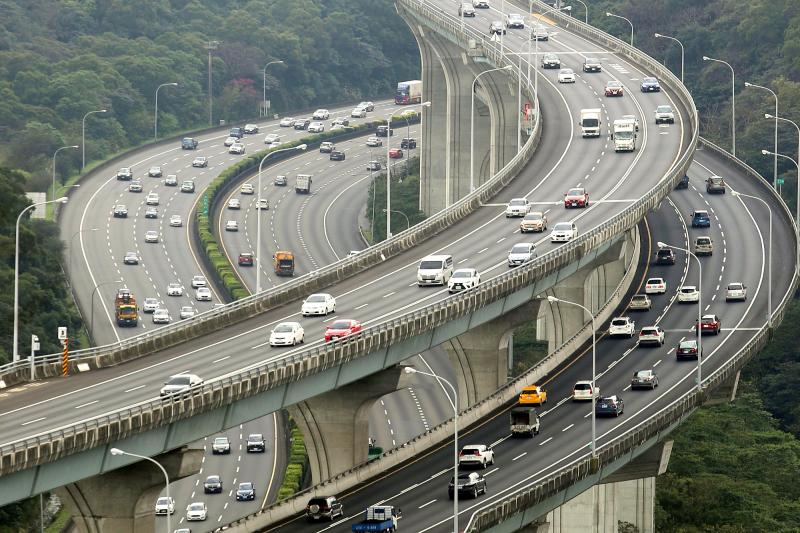Heavy traffic was yesterday reported on freeways across Taiwan, as people returned to their hometowns or flocked to major tourist hot spots at the start of the three-day weekend.
Yilan County police reported traffic jams on a recently improved section of the Suhua Highway, with heavy traffic observed as early as 5:30am and peak congestion at 8am.
The Freeway Bureau reported a traffic volume of 18.1 million vehicle-kilometers on Taiwan’s freeways, following an earlier prediction of 115 million vehicle-kilometers for the whole long weekend, or about 1.3 times that of average normal weekday traffic.

Photo: CNA
Vehicle-kilometers measure traffic flow by multiplying the number of vehicles on a traffic network by the average length of their trips.
Several protocols were put in place to respond to the anticipated traffic spikes and jams.
As part of the protocols, a high-occupancy policy was from 6am until noon imposed on vehicles entering the Chiang Wei-shui Memorial Freeway’s (Freeway No. 5) southbound interchange in Taipei’s Nangang District (南港), where only vehicles with more than three occupants were allowed to enter the freeway.
From midnight until noon, access ramps on the Pingjhen system interchange in Taoyuan and the Puyan system interchange in Changhua on the Sun Yat-sen Freeway (Freeway No. 1) were shut down to regulate traffic.
Other measures include charging NT$0.9 per kilometer traveled, while the usual daily toll-free distance of 20km has been suspended, as well as waiving freeway fees daily from midnight to 5am during the long weekend.
The bureau said that commuters and carpoolers could use provincial highways as alternatives to avoid traffic congestion on the freeways.
Monday’s national holiday commemorates the victims of the 228 Massacre, in which tens of thousands of civilians were killed following a crackdown by government forces on demonstrators and local elites after a confrontation between officials and Taipei residents on Feb. 27, 1947.

INFRASTRUCTURE: Work on the second segment, from Kaohsiung to Pingtung, is expected to begin in 2028 and be completed by 2039, the railway bureau said Planned high-speed rail (HSR) extensions would blanket Taiwan proper in four 90-minute commute blocs to facilitate regional economic and livelihood integration, Railway Bureau Deputy Director-General Yang Cheng-chun (楊正君) said in an interview published yesterday. A project to extend the high-speed rail from Zuoying Station in Kaohsiung to Pingtung County’s Lioukuaicuo Township (六塊厝) is the first part of the bureau’s greater plan to expand rail coverage, he told the Liberty Times (sister paper of the Taipei Times). The bureau’s long-term plan is to build a loop to circle Taiwan proper that would consist of four sections running from Taipei to Hualien, Hualien to

A relatively large earthquake may strike within the next two weeks, following a magnitude 5.2 temblor that shook Taitung County this morning, the Central Weather Administration (CWA) said. An earthquake struck at 8:18am today 10.2km west of Taitung County Hall in Taitung City at a relatively shallow depth of 6.5km, CWA data showed. The largest intensity of 4 was felt in Taitung and Pingtung counties, which received an alert notice, while areas north of Taichung did not feel any shaking, the CWA said. The earthquake was the result of the collision between the Philippine Plate and the Eurasian Plate, the agency said, adding

Snow fell in the mountainous areas of northern, central and eastern Taiwan in the early hours of yesterday, as cold air currents moved south. In the northern municipality of Taoyuan, snow started falling at about 6am in Fusing District (復興), district head Su Tso-hsi (蘇佐璽) said. By 10am, Lalashan National Forest Recreation Area, as well as Hualing (華陵), Sanguang (三光) and Gaoyi (高義) boroughs had seen snowfall, Su said. In central Taiwan, Shei-Pa National Park in Miaoli County and Hehuanshan National Forest Recreation Area in Nantou County saw snowfall of 5cm and 6cm respectively, by 10am, staff at the parks said. It began snowing

The 2025 Kaohsiung Wonderland–Winter Amusement Park event has teamed up with the Japanese manga series Chiikawa this year for its opening at Love River Bay yesterday, attracting more than 10,000 visitors, the city government said. Following the success of the “2024 Kaohsiung Wonderland” collaboration with a giant inflatable yellow duck installation designed by Dutch artist Florentijn Hofman, this year the Kaohsiung Tourism Bureau collaborated with Chiikawa by Japanese illustrator Nagano to present two giant inflatable characters. Two inflatable floats — the main character, Chiikwa, a white bear-like creature with round ears, and Hachiware, a white cat with a blue-tipped tail